Nirbhik Nari: Opportunities and Challenges for Women from Entrepreneurship to Politics
We use Google Cloud Translation Services. Google requires we provide the following disclaimer relating to use of this service:
This service may contain translations powered by Google. Google disclaims all warranties related to the translations, expressed or implied, including any warranties of accuracy, reliability, and any implied warranties of merchantability, fitness for a particular purpose, and noninfringement.


The experts participating in the Koshi Pradesh edition of the dialogue 'Nirbhik Nari' organized by Nari Masik, a co-publication of Kantipur Publications, discussed the various dimensions of women's problems and challenges. A panel discussion was held between politicians, entrepreneurs, social sector leaders, doctors, intellectuals, volunteers and other experts in the program held in the provincial capital Biratnagar on Wednesday.



Koshi Chief Minister Kedar Karki and Deputy Speaker of the Federal Parliament Indira Rana Magar jointly inaugurated the programme, 'Empowered women, strong leadership', 'Employment in the country: youth concerns', healthy women, healthy country' and 'Microfinance made entrepreneurs, failure to pay loans caused problems. ' was a panel discussion in the title session. The chief guest of the
program Chief Minister Karki said that the state government has started creative activities for the overall development of women. He said that the province has become a pioneer in the campaign to make women successful entrepreneurs in particular. "We are ready to make women leaders entrepreneurs," added Chief Minister Karki, "Let's discuss what can be done about more women."
In the province, 96,000 women get pregnant annually, but only 82,000 babies are born. Submitting the data that the rest of the children die immediately and 15,000 are born with disabilities, he said that to reduce the child mortality rate, the government will arrange free treatment for children under 10 years of age. "In our state, women's literacy is 16 percent less than men's," he said. He shared the experience that the demand for the budget for the development of women and society as a whole is low and said, 'I know that no one has asked for a budget for women and society as a whole except for the various clans, clans, clans, clans, clans, community buildings, etc. No.'
Deputy Speaker Rana Magar remarked that even though federalism has come to the country, the people have not been able to feel it directly. He claimed that the federal government has not yet shown generosity in giving powers to the provinces. She said, "We are operating the powers of the province from the remote control of the centre. That didn't happen. Powers had to be delegated to the provinces. She said that there is no option for the center to delegate powers to strengthen the local governments along with the provinces. "If that happens, the people will finally get to feel their attachment to federalism," the deputy speaker added, "otherwise there may be complications in the implementation of federalism."
Just as a mother's role is to give the right culture to the home, so the role of women's leadership to move the country forward, she said that it is necessary to make women participate in the forefront of political leadership. "Women play a big role in reducing corruption," she added, "that's why women should be brought into leadership." If corruption is reduced, more than half of the country's problems will be solved.'
In the first session titled 'Saksham Nari: Sabal Jahadat', Indira Thapa, Minister of State for Economic Affairs and Planning, Biratnagar High Court Judge Sridharakumari Pudasaini, women entrepreneur Kriti Shrestha and Dalit rights activist Savitra Periyar participated in the discussion. Facilitated by Nari Masik journalist Lakshmi Bhandari, the speakers of the discussion discussed various ways to increase women's participation at the leadership level. The speakers also discussed the infrastructure needed to increase the number of women at the decision-making level and the initiatives to be taken forward in the future.
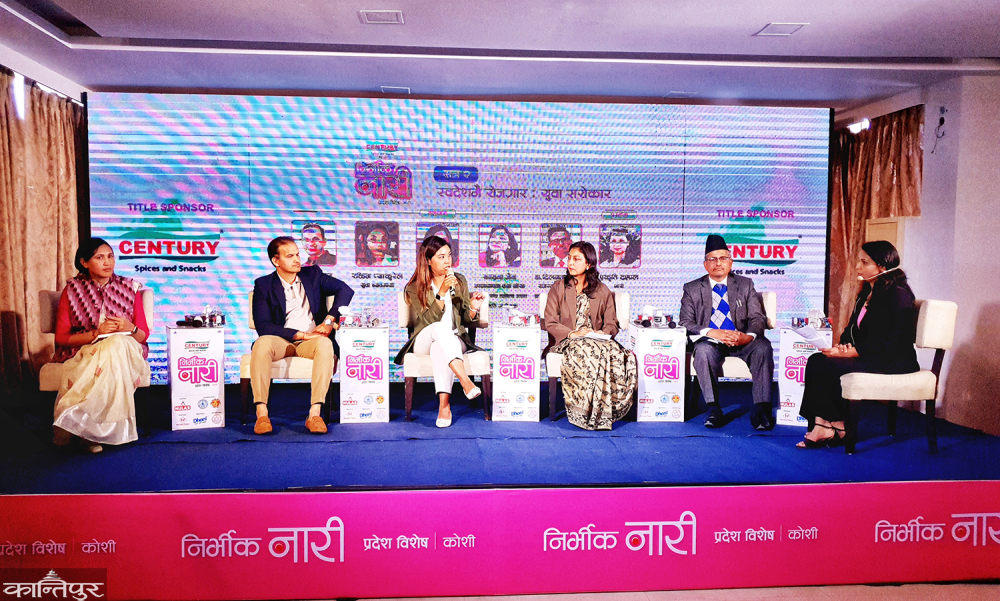 Young entrepreneurs Gaurav Dugad and Raktim Pyakurel, Shilpa Karki, Vice-Chancellor of Biratnagar Metropolitan Municipality, Vice-Professor Bandana Jain and Dilnath Fuel, Registrar of Manmohan Technical University, spoke in the second session on 'Swadeshmai Rozhgar: Yuva Sorokar'. In this discussion, which was facilitated by journalist Prakriti Dahal, the speakers said that there should be a guarantee of employment in the country to prevent manpower from going abroad. The speakers said that the industrialists were closed due to political instability. The speakers also complained that there was no environment for capable young people who studied abroad to return to the country and work in the country.
Young entrepreneurs Gaurav Dugad and Raktim Pyakurel, Shilpa Karki, Vice-Chancellor of Biratnagar Metropolitan Municipality, Vice-Professor Bandana Jain and Dilnath Fuel, Registrar of Manmohan Technical University, spoke in the second session on 'Swadeshmai Rozhgar: Yuva Sorokar'. In this discussion, which was facilitated by journalist Prakriti Dahal, the speakers said that there should be a guarantee of employment in the country to prevent manpower from going abroad. The speakers said that the industrialists were closed due to political instability. The speakers also complained that there was no environment for capable young people who studied abroad to return to the country and work in the country.
In the third session titled 'Healthy Women: Clean Country', Dr. Secretary of the Ministry of Health of Koshi Province. Dr. Sudha Devkota, gynecologist and obstetrician. Balkrishna Sah, former deputy head of Dharan sub-metropolitan Manju Bhandari and women's health volunteer Koshaksha Kausar discussed women's health and problems.
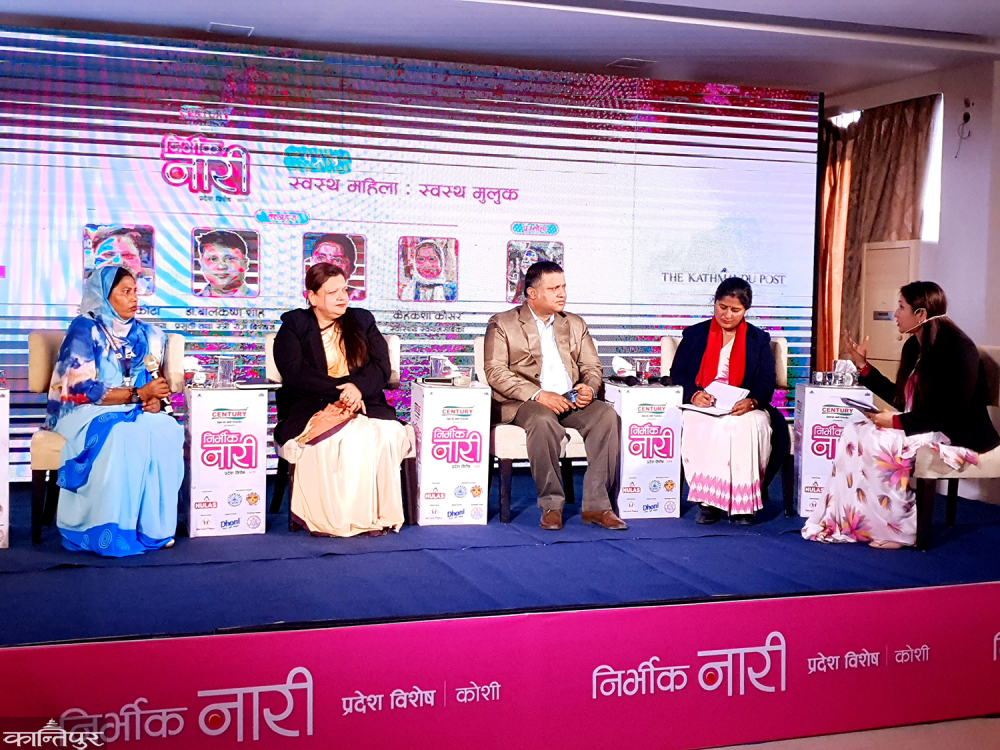 If women are healthy, not only the family, neighborhood, society, but the entire country will be healthy, the speakers claimed that healthy women can perform every job in an excellent manner. However, he said that the government should be serious about the various health problems which have been seen adversely affecting women's health recently. Journalist Sushila Pathak facilitated the session.
If women are healthy, not only the family, neighborhood, society, but the entire country will be healthy, the speakers claimed that healthy women can perform every job in an excellent manner. However, he said that the government should be serious about the various health problems which have been seen adversely affecting women's health recently. Journalist Sushila Pathak facilitated the session.
In the last session titled 'Microfinance made entrepreneurs, non-payment of loans caused problems', Ramdayal Rajvanshi, chief executive of Forward Microfinance, Sanjay Mandal, chief executive of Microfinance microfinance, successful entrepreneur Nasima Khatun and economist Veshprasad Dhamala discussed various problems caused by microfinance and what it caused. Discussed the achievements. Facilitated by journalist Suresh Raj Neupane, this session had an in-depth discussion on the various crises and challenges of financial issues which have become a matter of interest and concern in recent times. It was discussed that microfinance not only caused problems but also contributed to economic empowerment.
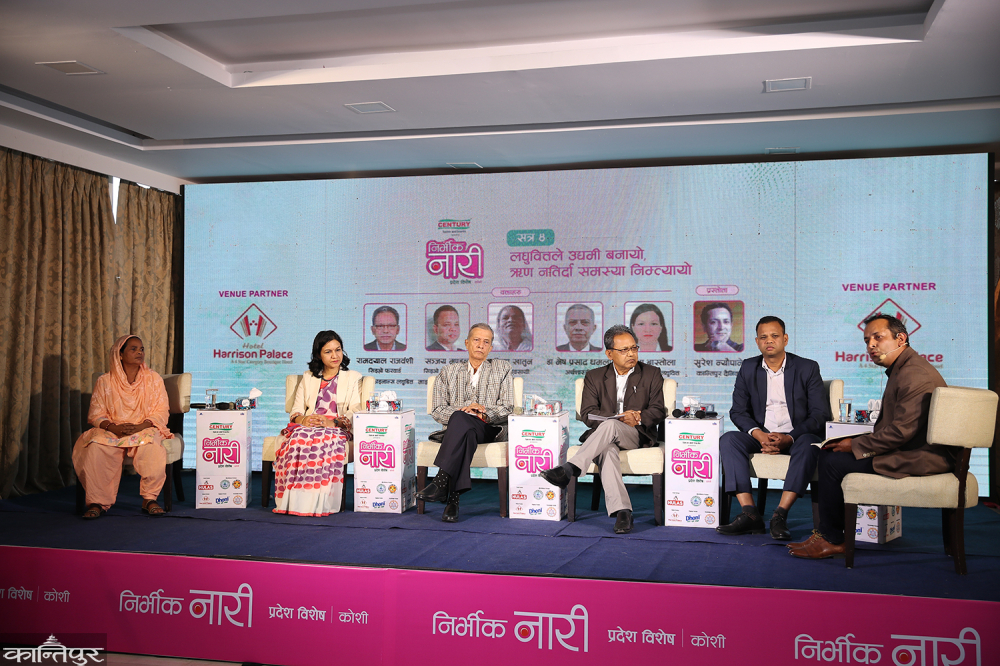 The speakers emphasized on the problems and solutions seen in the recent microfinance sector, which has become a reality for small and domestic entrepreneurs-businessmen. The chief executive of Kantipur Media Group, Mahesh Swaran, highlighted the rationale of the program at the event, which was welcomed by Upasana Ghimire, editor of Nari Masik. The program conducted by Pawan Acharya, station manager of Radio Kantipur, was concluded by a woman journalist, Sujata Mukhia, with a vote of thanks. More than 200 people affiliated with various organizations of Koshi region participated in the program.
The speakers emphasized on the problems and solutions seen in the recent microfinance sector, which has become a reality for small and domestic entrepreneurs-businessmen. The chief executive of Kantipur Media Group, Mahesh Swaran, highlighted the rationale of the program at the event, which was welcomed by Upasana Ghimire, editor of Nari Masik. The program conducted by Pawan Acharya, station manager of Radio Kantipur, was concluded by a woman journalist, Sujata Mukhia, with a vote of thanks. More than 200 people affiliated with various organizations of Koshi region participated in the program.
'All-round development of women is necessary'
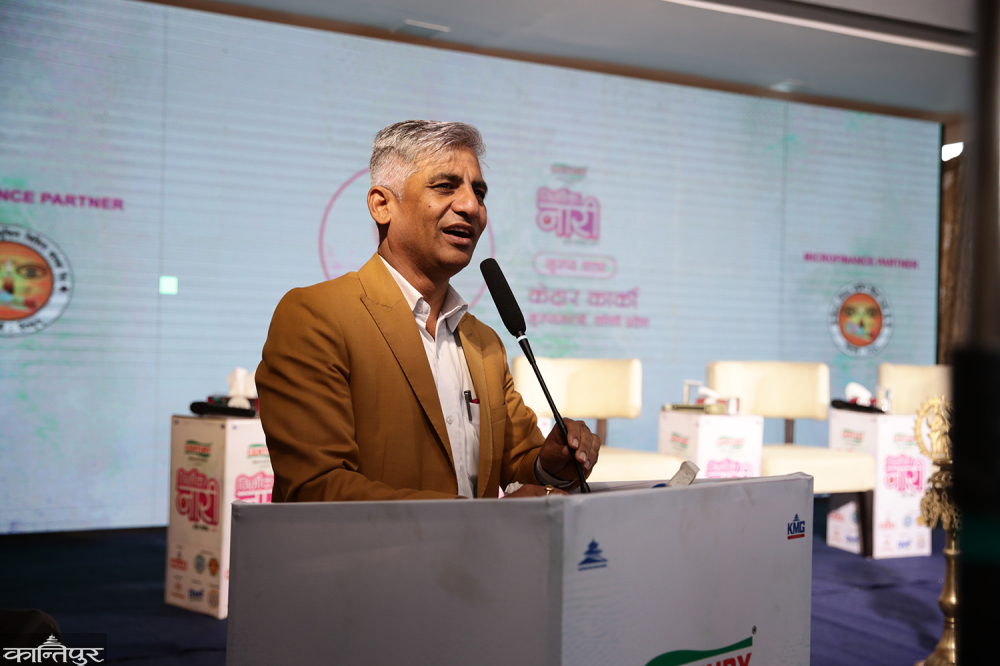 Kedar Karki
Kedar Karki
Chief Minister, Koshi Pradesh
The state government is proceeding differently for the all-round development of women . Initiatives have also been started to make women entrepreneurs . Let's discuss what can be done about more women. As rights can only be gained by fighting, the provincial government will create an environment to fight for rights and create capable and fearless women. In our province, women are 16 percent less literate than men. How did the population increase and literacy decrease? The provincial government will start making the literacy rate of men and women equal.
Since the demand for budget for the overall development of women and society is low, now I do not know that anyone is asking for a budget for the overall development of women and society, except for the total clan institutions of different castes, castes and clans, community buildings . It is necessary to end the practice of investing crores of rupees in clan-deities that no one has seen and reducing investment in living goddesses (women). Even though the position of women is high in religious rituals, we have the bitter reality of always being socially neglected.
'Sangh Anudar to give power to the state' 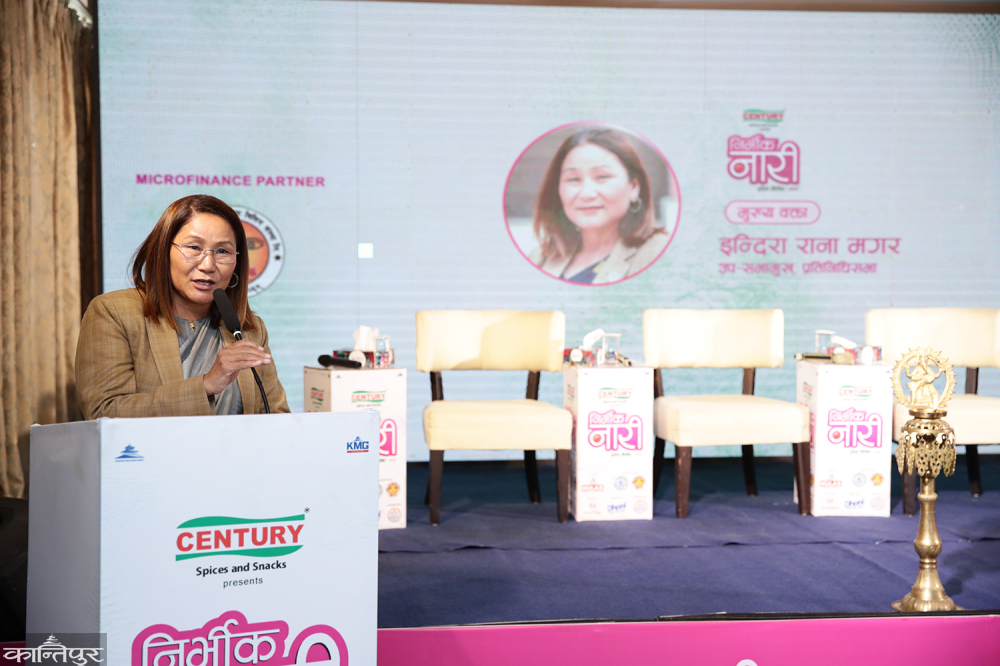 Indira Rana
Indira Rana
Deputy Speaker, Federal Parliament
Even though federalism has come to the country, the federal government is still reluctant to grant powers to the states. We are operating the powers of the province from the center's remote control . That didn't happen. Powers had to be delegated to the provinces. Even though it is mentioned in the constitution that the country will be made towards socialism, it is not mentioned what should be done for that .
There is no option for the center to delegate authority to strengthen the local government along with the state . If that happens, finally the people will be able to feel their attachment to federalism . Otherwise, complications may arise in the implementation of federalism. Just as a mother has the role of giving the right culture to the home, women's leadership has a role to take the country forward . Therefore, it is necessary to make women participate in the forefront of political leadership . Women have a big role in reducing corruption. That is the reason why women should be brought to the leadership . If corruption is reduced, more than half of the country's problems will be solved automatically.
प्रकाशित : फाल्गुन २४, २०८० ०७:१८
















